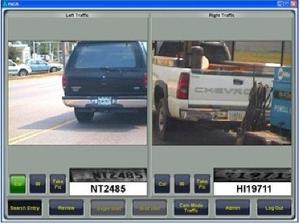License-plate readersWisconsin legislature considering restriction on LPRs
State legislators in Wisconsin have proposed a law to limit the use of license plate readers, drawing criticism from local law enforcement. Republican state Representative David Craig, the sponsor of the proposed legislation, said: “The vast majority of [the LPR] images are becoming nothing more than a database of the whereabouts of average citizens. The time has come to ensure the civil rights of citizens are not being violated, while also ensuring law enforcement has the tools needed to effectively enforce our state’s laws.”

LPR display shows original plate image as well as results of read // Source: enorstar.com
State legislators in Wisconsin have proposed a law to limit the use of license plate readers, drawing criticism from local law enforcement. Placing limitations on the use of readers “will undoubtedly have serious public safety consequences,” Racine County Sheriff Christopher Schmaling said. Racine’s Chief of Police Art Howell said his department operates five license plate readers for traffic enforcement, investigations, and special events. Howell admitted that the police department keeps information on recorded license plates indefinitely.
The Journal Times reports that the legislation proposed at the state Capitol would limit the use of license plate readers and the amount of time law enforcement could keep the information on file. “This bill addresses an alarming expansion of the use of automatic license plate reader technology by law enforcement,” Republican state Representative David Craig, wrote in a memo to fellow legislators last week. Craig said he understands the reasons for using license plate readers to investigate criminals, but he said he is concerned with the storage time of files obtained by license plate readers.
“The vast majority of these images are becoming nothing more than a database of the whereabouts of average citizens,” Craig wrote. “The time has come to ensure the civil rights of citizens are not being violated, while also ensuring law enforcement has the tools needed to effectively enforce our state’s laws.”
An analysis by Wisconsin’s nonpartisan Legislative Reference Bureau (LRB) advises that under the proposed legislation, law enforcement agencies would be prohibited from using license plate readers “except as part of an active criminal investigation of an identified suspect.” Sgt. Jessie Metoyer, spokeswoman for the Racine Police Department,notes that a common use of license plate readers is for scanning vehicles located near crime scenes. In such cases, a suspect may not be identified at the time.
The LRB also notes that according to the proposed legislation, “all information obtained must be destroyed within 48 hours unless the information is necessary for the purpose of further investigation or prosecution of the identified suspect or for another criminal investigation or prosecution.” In response, Metoyer said deleting information obtained from license plate readers within a 48-hour time frame is “unreasonable and concerning.”
“You might not know who your offender is within the first 48 hours,” she said. “Eventually, people may come forward with information or a person may be identified later, and that (license plate) information would be very, very valuable to us.”
County Sheriff Schmaling said his office does not operate license plate readers due to lack of funding. He also argued that readers would perform more quickly and efficiently the task officers currently perform. In an e-mail to theJournal Times, Schmaling stated, “As properly licensed vehicle owners and operators, we shouldn’t expect to have any expectation of privacy to our license plate information that is clearly out in the open for identification purposes and used only by law enforcement. Legally driving a properly licensed automobile on Wisconsin roadways is a privilege, not a right!”
